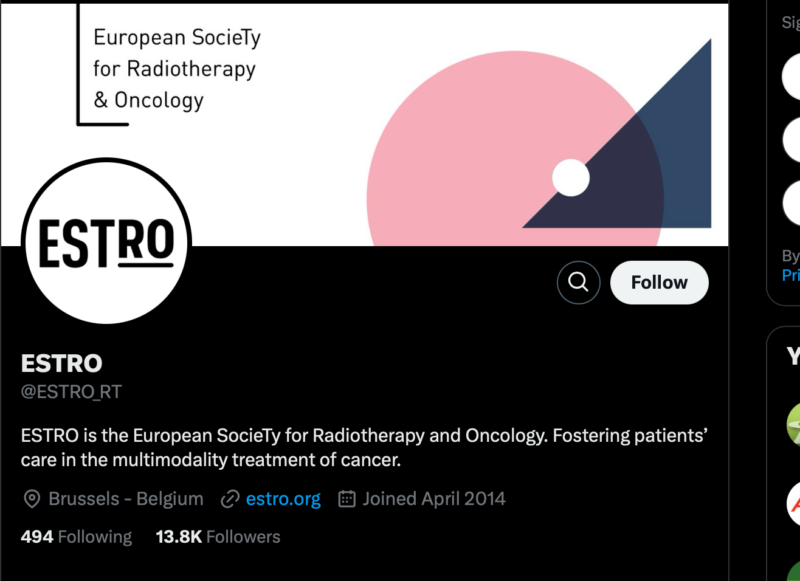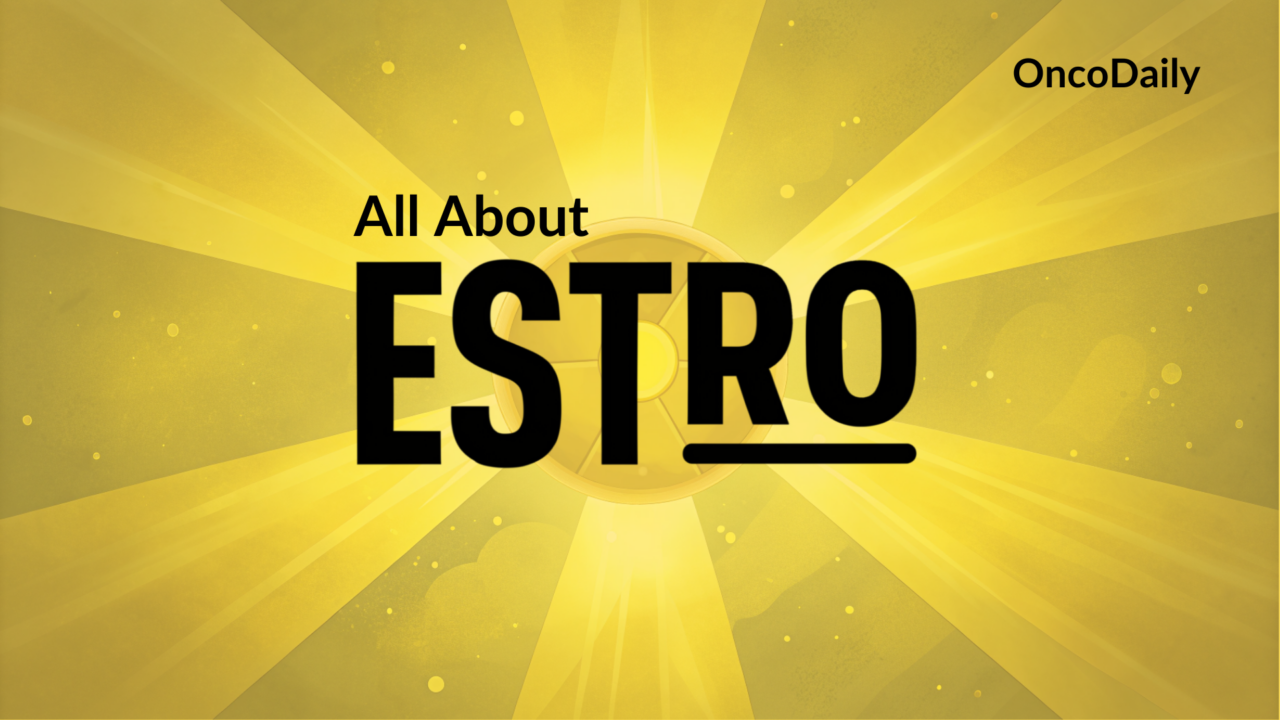The European Society for Radiotherapy and Oncology (ESTRO) is a professional, scientific organization that focuses on promoting innovation, research, and high standards in radiation oncology. Founded in 1980, at Milano, Italy, ESTRO has grown in membership and influence, becoming one of the most important platforms for professionals working in radiation oncology and related fields across Europe and beyond. The society unites radiation oncologists, clinical radiobiologists, medical physicists, radiation therapists, and other healthcare professionals involved in cancer treatment, research, and education.
What does ESTRO do?
ESTRO’s mission is clear: to advance the role of radiation oncology within multi-disciplinary cancer treatment. The organization focuses on setting high standards in cancer care through scientific innovation, education, and collaboration across disciplines like radiotherapy, radiobiology, and medical physics. ESTRO aims to ensure that cancer patients worldwide receive high-quality and cutting-edge care, integrating radiotherapy into personalized treatment plans.
Who Can Join ESTRO? Membership Benefits
Over the years, ESTRO has developed a large membership base, drawing professionals from various disciplines that contribute to radiotherapy and oncology. This includes not only radiation oncologists but also medical physicists, dosimetrists, radiation therapists( RTT’s), and clinical researchers. ESTRO promotes collaboration among these experts, recognizing that multidisciplinary teamwork is essential for improving cancer care. Through its events, educational courses, and scientific publications, ESTRO facilitates the exchange of knowledge and best practices across Europe and around the world.
ESTRO brings together a diverse community, including:
- Radiation oncologists
- Clinical radiobiologists
- Medical physicists
- Radiation therapists (RTTs)
- Dosimetrists
- Researchers
With over 7,300 members worldwide, the society promotes collaboration across professions to improve patient outcomes. Becoming a member gives you access to:
- Educational resources like e-learning, workshops, and congresses
- The opportunity to publish research in the prestigious journal, Radiotherapy & Oncology (The Green Journal)
- Networking opportunities with global experts in radiotherapy
- Career development through mentorship programs and professional growth tools
ESTRO Congresses
One of ESTRO’s key activities is organizing its highly regarded annual congresses, attended by thousands of professionals from all over the world. These events are pivotal for advancing cancer care, sharing the latest research, and discussing cutting-edge technologies.
When and Where Is the Next ESTRO Congress?
The ESTRO Annual Congress usually takes place in spring, with the most recent editions being hosted in cities like Madrid, Vienna, and Copenhagen. In 2025, it will be held in Vienna, from May 2nd to May 6th.

Find out more about ESTRO 2025
How Many People Attend the ESTRO Congress?
The annual congress typically attracts over 6,000 attendees from over 80 countries. It is a global platform where radiation oncologists, medical physicists, radiobiologists, and clinical researchers exchange ideas and insights.
What Is the Cost of Attending an ESTRO Congress?
The cost to attend the congress varies based on membership status and registration dates*.
- Early-bird member registration: 475 €
- Non-member registration: 840 €
- Students and RTTs receive discounted rate։ 345€
*This prices are for ESTRO 2025 congress
Are There Scholarships or Grants?
Yes! ESTRO offers several travel grants and scholarships to encourage participation, particularly from young professionals and researchers from low- and middle-income countries (LMICs). These grants can cover part or all of the registration fees and sometimes accommodation costs.
How Can You Submit Abstracts or Present at an ESTRO Congress?
If you’re interested in presenting research at ESTRO congresses, you can submit abstracts. The submission deadlines typically fall around November for the following year’s congress, so it’s essential to prepare early. Accepted abstracts provide an opportunity to share your work with leading experts and receive valuable feedback.
Who Leads ESTRO?
The current ESTRO President is Prof. Matthias Guckenberger, a renowned figure in radiation oncology. Under his leadership, ESTRO continues to promote advancements in cancer care while advocating for better access to radiotherapy worldwide.
Types of ESTRO Congresses
While the ESTRO Annual Congress is the flagship event, the organization also hosts several specialized and thematic congresses throughout the year, each catering to specific areas of radiotherapy and oncology:
- ESTRO Annual Congress: The largest and most comprehensive event, covering all aspects of radiotherapy and oncology, bringing together thousands of professionals from around the globe.
- ESTRO Physics Workshop: A specialized meeting dedicated to the latest advances in medical physics, focusing on innovations and techniques directly impacting radiotherapy.
- ESTRO Forums and Joint Congresses: These events are held in collaboration with other leading oncology organizations, promoting interdisciplinary collaboration and global initiatives to advance cancer care.
ESTRO congresses are recognized as pivotal events in the world of oncology, influencing clinical practice, research directions, and technological innovations. The high-quality scientific content presented at these congresses often shapes future treatment guidelines, driving the adoption of new techniques and improving patient outcomes. Furthermore, the congresses play a crucial role in professional development, offering a wealth of educational opportunities that allow participants to stay current in the rapidly evolving field of radiotherapy.

[Image: ESTRO 2024; Source:Brainlab]
ESTRO 2024 Top Abstracts
- CyberKnife System
6131: A phase 2 study (STEAL) on high-dose, adaptive SBRT for 52 patients with abdominal oligometastases, treated with the CyberKnife System, showed a 96% local control rate after one year with minimal toxicity. This has now become the standard care for these patients.
28292: Seventy-three patients with recurrent gynecological cancers, of which 53 were treated with SBRT on the CyberKnife System, achieved good local control and delayed systemic therapy by 12 months, improving their quality of life.
4913: The SPARC trial, a phase 2 prospective study, treated dominant intraprostatic lesions using an integrated boost on the CyberKnife System. Twenty patients were followed for a median of 30 months, showing the treatment was feasible and well tolerated with acceptable acute toxicity. - Radixact/TomoTherapy System
7574: An independent team from Skane assessed Synchrony® real-time tracking on the Radixact System, confirming its accuracy in detecting prostate tumor movement during treatment. This could enable reduced target margins, minimizing exposure to healthy tissue and allowing for potential dose escalation, boosting confidence in treatment delivery.
31095: Ten high-risk leukemia patients undergoing allogeneic stem cell transplants received 20 Gy total marrow irradiation (TMI) on the TomoTherapy System, compared to the standard 13.5 Gy. At 22 months post-transplant, none had relapsed, demonstrating that 20 Gy is feasible with manageable toxicity in this challenging patient group.
34076: A randomized phase 3 trial on 146 patients with stage 3 non-small cell lung cancer compared 60 Gy in 30 fractions to 60 Gy in 20 fractions using the TomoTherapy System. The study found no significant differences in toxicity between the two groups and showed that moderately hypofractionated radiotherapy improves overall survival while reducing treatment time, which can help increase patient throughput. - 20 abstracts on prostate brachytherapy at ESTRO24

[Image: ESTRO 2024]
ESTRO’s Educational Opportunities: Continuous Professional Development
ESTRO isn’t just about congresses. It offers a broad range of educational programs aimed at equipping healthcare professionals with the skills needed for continuous development. This includes:
- In-person and online teaching courses
- Workshops on advanced radiotherapy techniques, such as proton therapy and stereotactic body radiotherapy (SBRT)
- Certification programs to enhance professional qualifications
One of the major contributions of ESTRO is its commitment to scientific research and education. ESTRO organizes annual congresses, which are widely regarded as some of the most influential events in the field of oncology. ESTRO also encourages the publication of research through its journal, Radiotherapy & Oncology, also known as “The Green Journal.” This peer-reviewed journal features high-quality research studies, reviews, and clinical guidelines, contributing significantly to the scientific literature on radiation therapy.

In addition to congresses, ESTRO offers a wide range of educational opportunities. These include teaching courses, workshops, and e-learning platforms designed to help professionals stay up-to-date with the latest advancements in radiotherapy. ESTRO’s educational offerings cover a broad spectrum of topics, from basic radiotherapy techniques to advanced technologies like proton therapy, stereotactic body radiotherapy (SBRT), and image-guided radiotherapy (IGRT). The society places a strong emphasis on continuous professional development, ensuring its members are equipped with the skills and knowledge needed to provide the highest level of care.
Advocacy for Radiotherapy: A Global Focus
ESTRO is a strong advocate for radiotherapy as an integral part of comprehensive cancer care. It works closely with organizations such as the International Atomic Energy Agency (IAEA) and the European Cancer Organisation (ECO) to influence policies that improve access to radiotherapy, especially in low-resource settings.
Through these collaborations, ESTRO ensures that even patients in underserved regions benefit from the latest advancements in radiation technology.
New Technologies: What’s Next in Radiation Oncology?
As cancer treatment shifts toward personalized medicine, ESTRO is at the forefront of technological advancements in the field. From improved imaging techniques to AI-driven treatment planning and proton therapy, ESTRO ensures that its members are equipped with the latest tools to provide precise and effective treatments.
How Does ESTRO Ensure Safety and Quality in Radiotherapy?
Radiotherapy’s complexity requires strict quality and safety standards, and ESTRO plays a pivotal role in shaping these. The society regularly updates its treatment guidelines to reflect new research and technological innovations, ensuring that professionals follow best practices in treatment delivery and patient care.
Future Directions: ESTRO’s Vision for Radiotherapy
Looking to the future, ESTRO is focused on the integration of radiotherapy in personalized cancer treatment plans. With cancer research progressing towards understanding tumor genetics and biology, radiotherapy is evolving to provide precise, targeted treatments that are tailored to the specific needs of each patient.
By embracing innovation and fostering collaboration, ESTRO continues to be a driving force in the global fight against cancer.
Why Should You Join or Follow ESTRO?
Whether you’re a professional in radiation oncology or someone interested in cancer research, joining ESTRO or following its activities provides unparalleled access to education, networking, and cutting-edge science. Being part of this community means contributing to a future where cancer patients receive the most effective and personalized treatments.
You can Follow ESTRO in X



